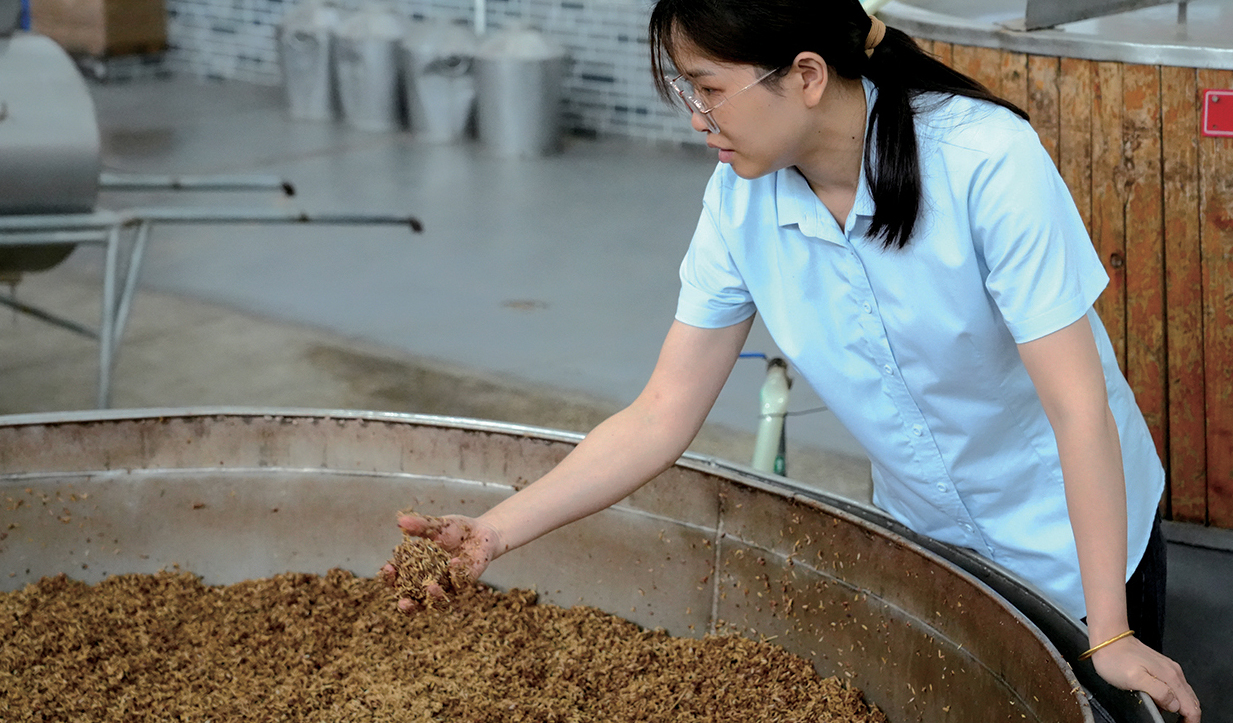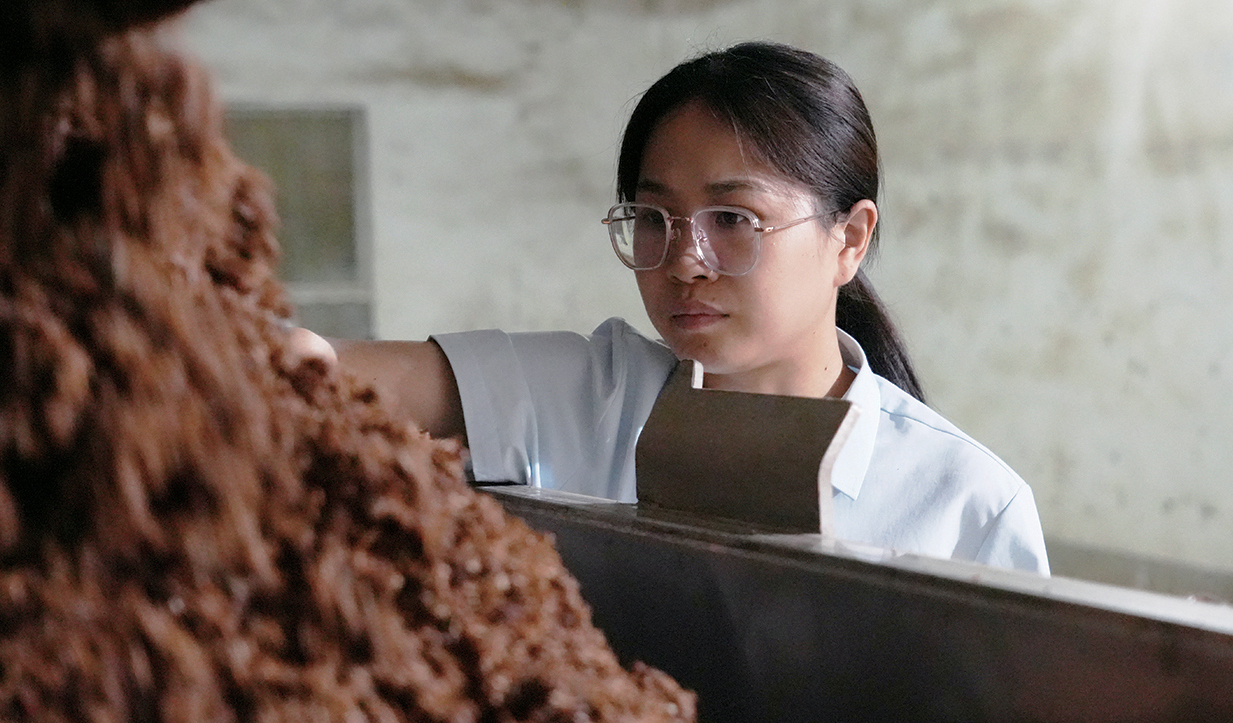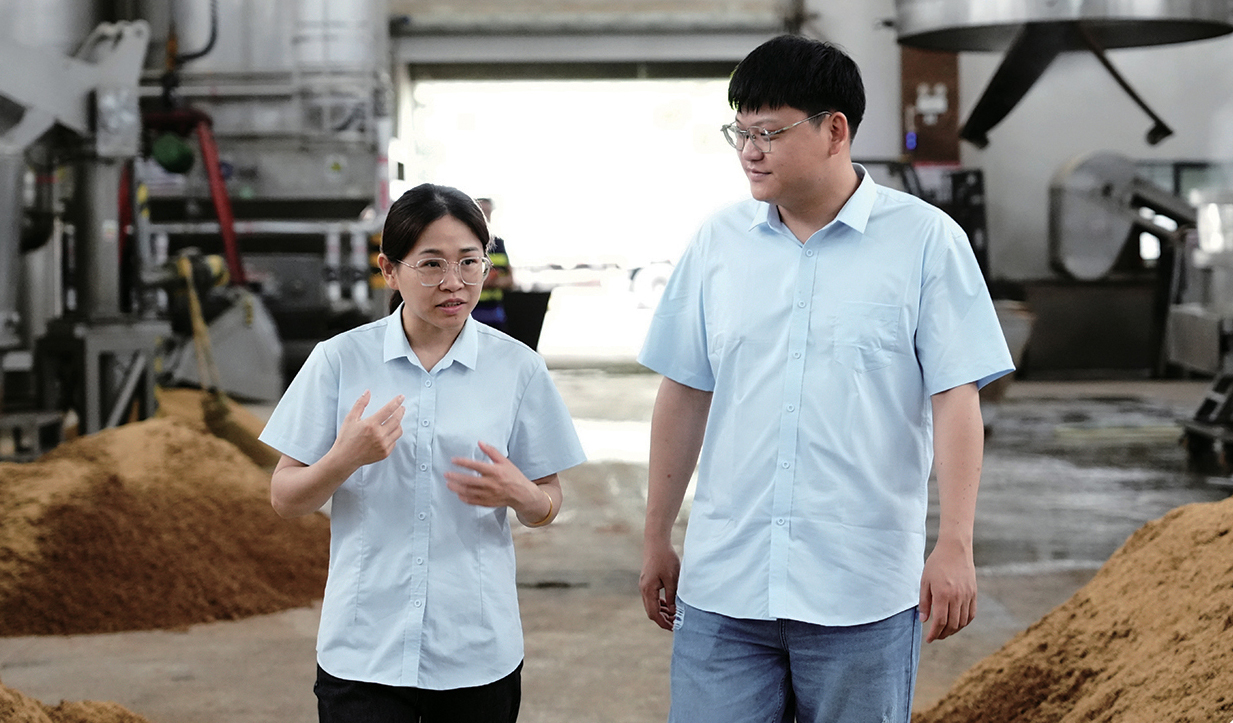Shi Feng, a determined female distiller, challenges gender norms by mastering the craft of distillation and progressing from apprentice to workshop director.

At a workshop of the Yellow Crane Tower Distillery in Wuhan, Central China's Hubei province, numerous large steel barrels are filled with fermented sorghum mash — the essential ingredient for producing baijiu, a Chinese spirit. Next to these barrels, giant steamers and pipes aid in the distillation process, transforming the grain into liquor, which is then stored for aging.
At 30 years old, Shi Feng possesses the ability to tell the moisture content of sorghum simply by squeezing it, with an accuracy margin of less than 1 percent. By handling the mash, she precisely assesses the temperature within a deviation of just one degree. After distillation, she can also determine the alcohol content by observing the size, dissipation rate, uniformity, and longevity of the baijiu's bubbles.
It took Shi five years to master these skills. Joining the distillery in 2016 after graduating from university, she started her journey from the ground up, eventually rising to become workshop director by 2021.
READ MORE: Liquor taster embodies spirit of her craft
Proficient in every aspect of the brewing process, she supervises the entire production workflow. Among the 36 employees in the workshop, Shi is the only female distiller and the youngest, yet she now serves as a mentor to all the other distillers.
Historically, distillation was considered a "man's job". "Distilling was once physically demanding, so women were not typically involved," Shi explained. "However, with technological advancements, more women now participate in the craft. But still, female distillers are rare."
Every morning, distillers must inspect each step of the brewing process to ensure everything follows the set standards. Shi walks over 20,000 steps daily in the workshop's high-temperature environment. On one occasion, she even fainted while working because she was too busy to eat breakfast.

Given the stringent hygiene protocols in the food industry, Shi has consistently worn plain work clothes, refrained from using makeup, and avoided applying hair products over the years.
"This industry requires a stable mindset and a humble heart," she said.
As the only woman in the workshop, Shi faced skepticism and unjust criticism at first. In response, she held herself to even higher standards, earning respect through her expertise and performance.
"I have never sought lighter duties due to my smaller stature and strength. Instead, I actively assist my colleagues," she said.
Shi believes that female distillers possess unique strengths. "Women are meticulous in handling precise tasks. Proficiency in this field comes with experience — the longer we practise, the better we get," she said. "Women are also strong communicators, which helps resolve conflicts and manage the whole workshop efficiently."
From a novice to a technical expert, and now a manager and mentor, Shi's evolution and growth are evident. Specializing in bioengineering with a concentration in fermentation technology during her university studies, she entered the distillery through campus recruitment. Despite her academic background, most of the practical skills had to be acquired from scratch.
Distillation, as a traditional industry, relies on the apprenticeship model for the transmission of skills and knowledge. Shi's mentor, Qian Yanlin, is a distinguished inheritor of Wuhan's intangible cultural heritage, renowned for his mastery of light fragrance baijiu production.
Baijiu is unique for its distinct taste and aroma, categorized into four primary "fragrances": light, strong, rice, and soy sauce. Shi specializes in crafting light fragrance baijiu, known for its clear, transparent appearance and clean, refreshing aroma.

Nurturing craftsmanship
Over the span of seven years, Master Qian imparted crucial skills and techniques to Shi, such as sensory methods: feeling moisture differences by touch, assessing sorghum's texture by squeezing it, tasting acidity to evaluate fermentation quality, smelling to identify prominent aromas, and observing bubbles to determine alcohol content.
Additionally, Master Qian established an intangible cultural heritage preservation division within the distillery which collaborates with research institutions to investigate various metrics of baijiu using quantitative data. Shi actively engages in these initiatives, frequently shuttling between the workshop and the laboratory.
Beyond technical skills, Shi learned the significance of a craftsman's spirit from her mentor.
"Master stressed that work ethic and mindset are crucial for professional success. He taught me to fully commit to work, maintain a clear boundary between work and personal life, and focus solely on work during working hours," she recalled.
Gradually, Shi overcame her anxiety and impatience. "A proficient distiller must endure solitude and commit wholeheartedly to their craft without ever thinking of giving up," she said. "It may take a decade, two, or even longer to master this industry."
As veteran distillers retire one by one, a new wave of young talent is entering the distillery, much to Shi's delight. Seeing an increasing number of young people joining this age-old industry brings her hope and motivation.
Simultaneously, young consumers are taking a central role in the baijiu market. According to a white paper on the China baijiu industry in 2023, released by the China Alcoholic Drinks Association, there is a generational shift in the primary consumer demographic for baijiu.
Data indicates that individuals born between 1985 and 1994 are emerging as the predominant consumers, taking up 34 percent of the market. Meanwhile, the post-1995 generation (excluding those under 18) accounts for 18 percent of the market share.
ALSO READ: Uncorking their passion
To attract younger consumers, many renowned baijiu companies are adopting the "baijiu+" model, introducing innovations like baijiu-infused ice cream, liquor-filled chocolates, baijiu-flavored coffee, and beauty products derived from distillery by-products.
"Young people are full of energy and creativity. I aspire for the new generation of distillers, me included, to break free from conventional constraints and come up with innovative ideas and solutions," Shi said.
"From a solitary grain of sorghum to a refined glass of baijiu on our tables, the grain undergoes so many transformations," Shi reflected on her career, likening her journey to that of a grain. "Distillation is a realm where diligence surpasses born talent. Whatever profession we choose, we should love it, and ultimately, excel in it."
Contact the writers at guiqian@i21st.cn



